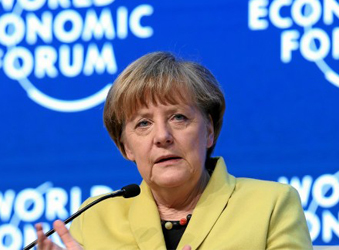German Chancellor Angela Merkel said on Thursday that strong economic growth offered scope to further expand government spending, which could help her conservatives hammer out a coalition deal with the Social Democrats.
The government this week raised its 2018 growth forecast to 2.4 percent from 1.9 percent after bullish economic data, which could translate into added tax revenues.
That would give more leeway to increase state spending over the next four years beyond what is currently envisaged in coalition talks, and potentially lower taxes.
Merkel, speaking after a meeting with leaders of the country’s 16 state governments, said the revised growth forecast clearly offered “additional margin” for coalition negotiators.
Talks on ending over four months of political limbo are seen likely to stretch into next week despite agreements on education, migration and pensions, politicians said on Thursday.
Investors worry the long failure to form a new government is delaying reforms at home and in the European Union, after an earlier bid to rule with smaller parties collapsed in November.
Senior negotiators reached agreement late Thursday on a package of education programs valued at 11 billion euros ($13.76 billion) that Manuela Schwesig, a top Social Democrat (SPD) negotiator, said could help win over members of her party who are skeptical about agreeing to another “grand coalition.”
“This flagship project of education offers the possibility to convince our members,” Schwesig, premier of the state of Mecklenburg-Vorpommern, told reporters. “We want to invest in the entire educational chain.”
To secure a fourth term in office, Merkel needs the center-left SPD to agree to a re-run of the coalition government that has ruled Europe’s biggest economy since 2013.
The party’s roughly 440,000 members could yet sink any deal as they have the final say in a ballot.
The JUSOS youth wing of the SPD and other leftist members are deeply opposed to rejoining a coalition under Merkel, fearing it will decimate their support.
A new poll by infratest dimap showed the SPD would win only 18 percent of the vote if new elections were held on Sunday, a drop of three percentage points from last month, and well below the post-war low of 20.5 percent the party won in the September elections.
But the prospect of added spending on education and digitalization projects could appease some leftist SPD voters.
Negotiators also reached agreement on Thursday on pension contributions, adding to consensus already reached on climate goals and family reunions for migrants. Differences remain on labor law, health reforms and taxes.
They agreed to guarantee a pension level of 48 percent of average income, with contributions to be capped at 20 percent.
Horst Seehofer, the combative conservative leader of Bavaria, remained skeptical about boosting additional government spending beyond a planned 46 billion euros through 2021, the basis of a blueprint agreed in exploratory talks last month.
On Thursday, Germany’s lower house of parliament voted to extend a ban on reunions of migrants until the end of July, agreed by would-be coalition partners just two days ago. The existing suspension, introduced in 2016, had been due to expire.
Merkel’s Bavarian allies have dug in their heels against more generous migrant policies demanded by the SPD.
source: Reuters


